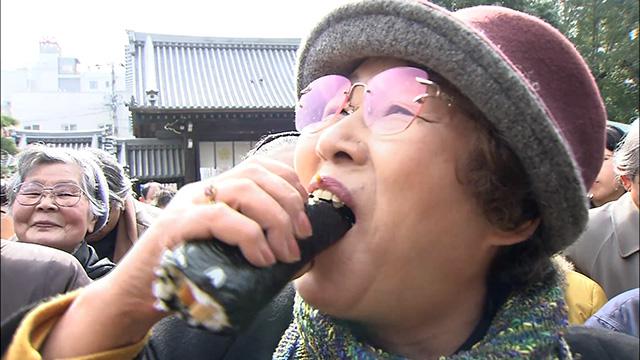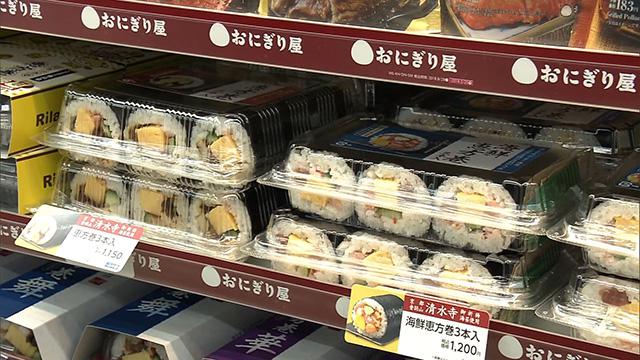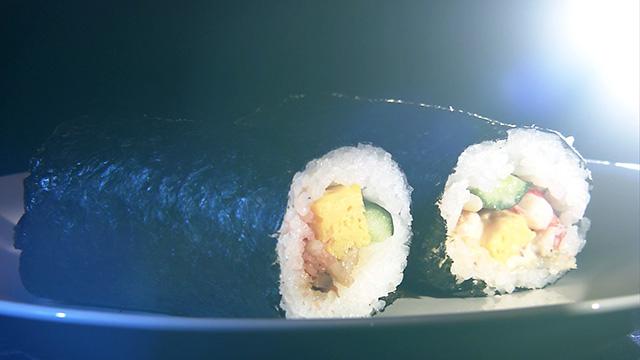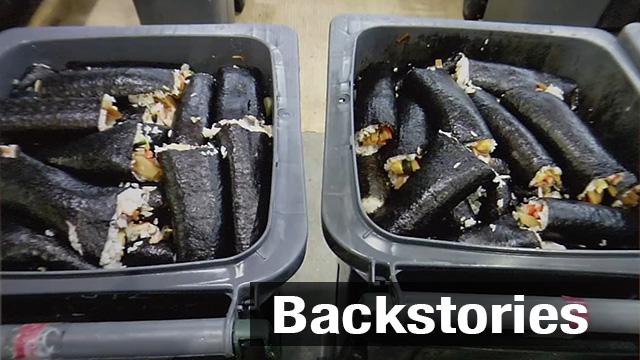
Ehomaki business on fire
Fierce competition to sell ehomaki sushi rolls kicked off early this year. A department store in Tokyo started selling in early January. The store also began taking pre-orders. Customers could choose from 150 types of sushi rolls, some gorgeously adorned with gold leaf, and others wrapped in roast beef rather than seaweed.
The custom started in western Japan, but has spread across the country, giving rise to local varieties. In Nagoya, Aichi Prefecture, there's a roll with a motif of a local icon, shachi-hoko, with miso-flavored pork cutlet roll, a local specialty. In Nagano Prefecture, people eat soba buckwheat noodle rolls. Each city and prefecture is eager to cash in during ehomaki season.
The manager of the department store says many customers come looking for ehomaki. "We must meet customers' expectations by providing a huge lineup of quality sushi rolls," he explained.

Government: Make only what's needed
The higher the previous year's sales, the more ehomaki are prepared for the following year. Businesses always follow the same course. As a result, huge volumes of unsold ehomaki go to waste every year.
Last year, footage of a large amount of sushi rolls being discarded mercilessly was shown on TV and picked up by social media, sparking a controversy.
The government is thus concerned about overheating business competition this year. The agriculture ministry for the first time issued a notice asking industrial associations of supermarkets, convenience stores and other outlets to reduce food waste by preparing just enough sushi rolls to meet demand.
Katsuhiro Miyamoto, Emeritus Professor at Kansai University, is an expert on economic impact. He calculated the monetary value of ehomaki that is discarded around Japan after Setsubun, the day the rolls are eaten.
Miyamoto estimated, based on online questionnaires and other data he studied, that 29.1 percent of the population aged 5 to 79, or about 32 million people, eat ehomaki, and that sales amount to over 25.7 billion yen, or US$234 million.
He assumed from interviews at supermarkets and convenience stores that the proportion that is discarded is about four percent. This led to the conclusion that at least 1.28 billion yen- or US$9.38 million-worth of ehomaki is going to waste each year.
Miyamoto says the monetary loss associated with the disposal of ehomaki has not been widely recognized because little nationwide data is available. He says further surveys are needed for more accurate projections.
The professor says that although his calculations are a rough estimate, he was surprised that the loss amounted to more than one billion yen. "The total economic loss is probably higher because waste disposal costs money. I hope my calculations will make people think more about food loss," Miyamoto added.

Shops try to prevent ehomaki waste
Some supermarkets and convenience stores have begun efforts to reduce ehomaki waste.
Leading convenience stores are promoting pre-orders of the sushi rolls by handing out coupons for discounts and free tea.
"Let's quit," says a leaflet issued by a supermarket chain in Hyogo Prefecture last year. The leaflet questions overproduction and declares that the store will make and sell only the amount it sold the previous year.
A fish store in Tokyo has also taken measures to tackle the huge amount of waste. The manager says the shop made about 30 kilograms more vinegared rice for ehomaki last year than was needed because he did not want to inconvenience customers by running out of stock. He says he regrets it.
This year, he set a goal of selling 2,500 sushi rolls, which is about 10 percent less than last year. He also says he will adjust the amount of sushi rolls he makes by frequently checking on sales. "It's tough to discard what's been made. We will try hard not to produce waste," the manager explained.

